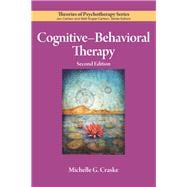In this revised edition of Cognitive–Behavioral Therapy, Michelle G. Craske provides vital updated coverage of the literature that explores the theory, history, therapy process, primary change mechanisms, and empirical basis of the approach, as well as likely future developments.
This essential primer to cognitive behavioral therapy, amply illustrated with case examples featuring diverse clients, is perfect for graduate students studying theories of therapy and counseling as well as for seasoned practitioners interested in better understanding this approach.
Cognitive–behavioral therapy (CBT) originated in the science and theory of classical and instrumental conditioning when cognitive principles were adopted following dissatisfaction with a strictly behavioral approach. CBT combines behavioral and cognitive interventions so that, on the behavioral level, practitioners can aim to decrease clients' maladaptive behaviors and increase adaptive ones, and, on the cognitive level, they can aim to modify clients' maladaptive thoughts, self-statements, or beliefs.
A large number of variations on the original theory have developed over the decades, but all types of CBT are unified by their empirical foundation, reliance on the theory and science of behavior and cognition, and the centrality of problem-focused goals. In this edition, the author provides vital updated coverage of the literature that explores the therapy process, primary change mechanisms, and empirical basis of the approach, as well as likely future developments.
This essential primer to cognitive behavioral therapy, amply illustrated with case examples featuring diverse clients, is perfect for graduate students studying theories of therapy and counseling as well as for seasoned practitioners interested in better understanding this approach.
Cognitive–behavioral therapy (CBT) originated in the science and theory of classical and instrumental conditioning when cognitive principles were adopted following dissatisfaction with a strictly behavioral approach. CBT combines behavioral and cognitive interventions so that, on the behavioral level, practitioners can aim to decrease clients' maladaptive behaviors and increase adaptive ones, and, on the cognitive level, they can aim to modify clients' maladaptive thoughts, self-statements, or beliefs.
A large number of variations on the original theory have developed over the decades, but all types of CBT are unified by their empirical foundation, reliance on the theory and science of behavior and cognition, and the centrality of problem-focused goals. In this edition, the author provides vital updated coverage of the literature that explores the therapy process, primary change mechanisms, and empirical basis of the approach, as well as likely future developments.








